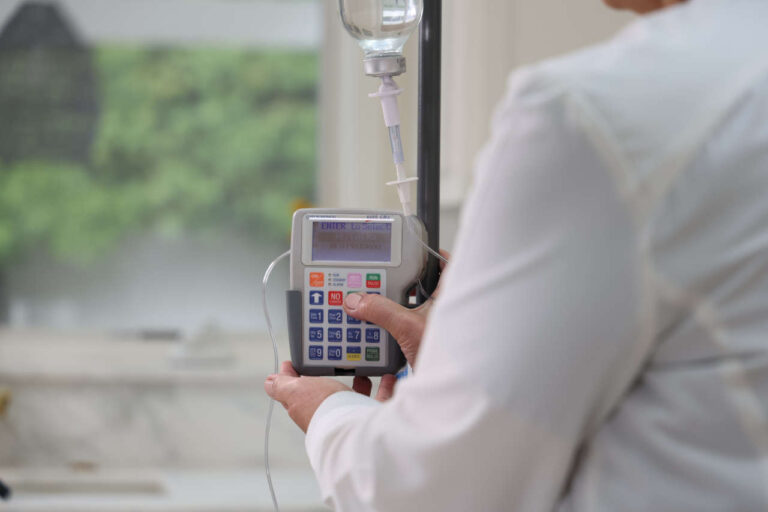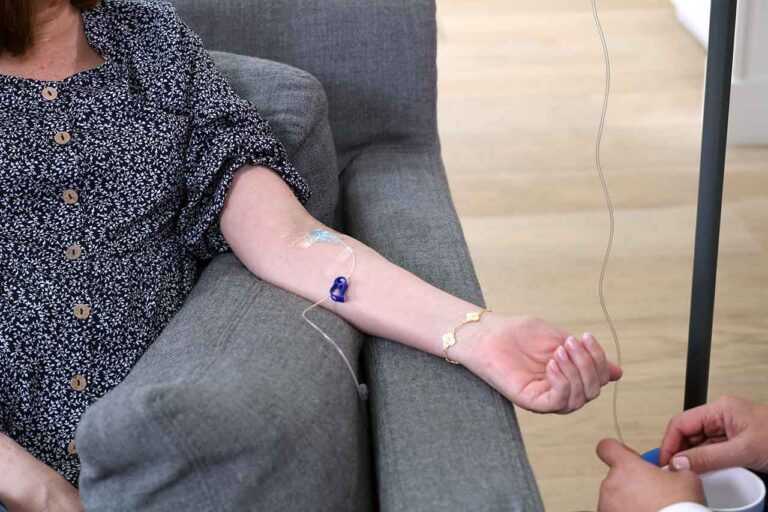
Toxic shock syndrome (TSS) is a rare condition caused by certain types of bacteria. It can be life-threatening. Even with antibiotic therapy and supportive care, TSS can lead to rapid deterioration and multiple organ failure. If diagnosis and treatment are delayed, the death rate due to Streptococcal TSS can exceed 50% [1]. However, in recent years, د رګونو له لارې امیونوګلوبولین (IVIG) has become a new hope in the fight against TSS. Several clinical studies have shown that IVIG can lower the death rate in TSS patients [1]. In this article, we’ll discuss everything you need to know about IVIG for toxic shock syndrome (TSS).
د IVIG کاپي مرسته ترلاسه کړئ
Toxic Shock Syndrome (TSS): Overview
Toxic shock syndrome (TSS) is caused by certain strains of bacteria that produce toxins (poisons). In most cases, two kinds of bacteria, سټیفیلوکوکس اوریوس او سټرپټوکوکس پیوجینز, are the culprits.
The toxins released by these bacteria act as “superantigens.” They cause your immune system to overreact and release a large amount of inflammatory chemicals called cytokines. This overreaction is called a cytokine storm. This can lead to serious damage to multiple organs in your body and can even cause death. This extreme immune reaction, not the bacteria itself, is what makes TSS so dangerous and life-threatening.

The signs and symptoms of TSS develop very quickly. They include [3]:
- High fever
- د وینې ټیټ فشار
- Diarrhea and vomiting
- Confusion or altered mental state
- Skin rash that feels rough
- Difficulty breathing or breathing very fast
- Severe pain all over your body
- Reddening of the tongue, palms, soles of the feet, and the whites of the eyes
In the case of TSS, you need early diagnosis and urgent treatment. The standard treatment of TSS involves:
- Antibiotics to kill the bacteria responsible for TSS.
- IV Fluids to prevent dehydration and maintain blood pressure.
- جراحي to remove infected or dead tissue in the body. In rare cases, your healthcare provider may need to amputate the affected area to save your life.
- Ventilation to help with breathing difficulties by administering oxygen through a mask. In more severe cases, patients might need a ventilator.
- Dialysis if your kidney stops functioning.
Your healthcare provider may also consider intravenous immunoglobulin (IVIG) with any of these treatments.
How Does IVIG Help?
Intravenous immunoglobulin (IVIG) is a product that contains human انټي باډي extracted from the plasma of thousands of healthy blood donors. It is widely used to balance and regulate the immune system in various inflammatory, autoimmune, and infectious diseases.
In the case of toxic shock syndrome (TSS), toxins released by certain bacteria cause an extreme immune reaction that damages your body’s organs. IVIG can help you with your condition by:
Neutralizing Bacterial Toxins: In TSS, the main cause of the dangerous immune overreaction is toxins (poison) released by certain bacteria. IVIG contains antibodies that can bind to and neutralize these harmful bacterial toxins [1][2].
Reducing Inflammation: IVIG can reduce the inflammation. It helps suppress the excessive immune activation that causes tissue damage and organ failure.
Helping the Body Fight Infection: IVIG may also strengthen your body’s defense system by delivering ready-made antibodies that can help your immune system fight off the bacteria that is causing the infection.
Overall, IVIG helps to calm the harmful immune reaction without weakening your body’s ability to fight the infection. This makes it a valuable addition to the treatment plan for patients with severe cases of TSS.
د IVIG متخصص سره مشوره وکړئ
Who Should Take IVIG for Toxic Shock Syndrome (TSS)?
IVIG isn’t a required treatment for every TSS patient. It is only used for severe cases where traditional treatments like antibiotics and supportive care are not working well enough.
According to the UK’s National Health Service (NHS), you can take IVIG for TSS if your condition doesn’t improve within 6 hours of aggressive treatment [4]. Similarly, the Australian National Blood Authority suggests that doctors can consider IVIG early in both streptococcal TSS and staphylococcal TSS when there’s no rapid improvement with standard care [5].
Ultimately, your healthcare provider will make the final decision based on the severity, timing, and overall clinical picture of your condition. In the case of TSS, quick decision-making and fast treatment are critical for the best outcome.
Effectiveness of IVIG in Toxic Shock Syndrome (TSS) Found in Clinical Trials
IVIG is not considered a first-line treatment for TSS. However, in clinical studies, it has shown promise as an add-on therapy, especially in severe or life-threatening cases that do not respond well to traditional treatment (antibiotics and supportive care) alone.
For example, a 2003 study showed that patients with streptococcal TSS who received IVIG had a significantly lower death rate (10%) compared to those who did not (36%) [6]. Similarly, a 2014 study showed that IVIG improved survival in patients with streptococcal toxic shock syndrome (STSS) [7]. Likewise, a 2018 study showed that IVIG administration in patients with streptococcal toxic shock syndrome was associated with a reduction in death from 33.7% to 15.7% [9].
A recent case study reported the story of a 63-year-old female with streptococcal TSS who didn’t respond to standard treatment. Despite receiving multiple treatments, she failed to improve clinically. Later, she received IVIG, which significantly improved her condition [8]. This demonstrates how IVIG can be an effective option when toxic shock syndrome does not respond to conventional treatments.
However, not all research supports its effectiveness. Some meta-analyses have found no significant reduction in mortality associated with IVIG use in streptococcal TSS [10]. Therefore, even though IVIG may offer benefits in certain scenarios, further large-scale and high-quality studies are needed to confirm its overall impact on outcomes in TSS.
د IVIG کور انفیوژن په اړه پوښتنه وکړئ
پوښتنې او ځوابونه
Here are some frequently asked questions about IVIG for toxic shock syndrome:
1. Is IVIG FDA-approved for treating toxic shock syndrome (TSS)?
No. The use of IVIG for TSS is not FDA-approved. However, several clinical studies have shown that IVIG can be an effective add-on therapy for TSS, particularly in severe or unresponsive cases [6][7][8][9][10]. Therefore, IVIG is often used “off-label” for TSS, based on the clinical judgement of the healthcare provider.
2. Can IVIG cure TSS on its own?
No. IVIG is an add-on therapy (supportive treatment). It doesn’t treat TSS on its own. IVIG must be used with antibiotics and other supportive care.
3. How long does it take for IVIG to work in toxic shock syndrome (TSS)?
Intravenous immunoglobulin (IVIG) can lead to clinical improvements in toxic shock syndrome (TSS) within hours of administration [11]. However, the full response time may vary from days to weeks depending on the severity of your condition, how early you received IVIG, and your overall health.
حوالې:
- Ross, A., & Shoff, H. W. (2023, August 7). Toxic shock Syndrome. StatPearls – NCBI Bookshelf. https://www.ncbi.nlm.nih.gov/books/NBK459345/
- Amreen, S., Brar, S. K., Perveen, S., Chaudhry, M. R., AlBabtain, S., & Khan, S. (2021). Clinical efficacy of intravenous immunoglobulins in management of toxic shock Syndrome: an updated literature review. Cureus. https://doi.org/10.7759/cureus.12836
- Website, N. (2025, June 4). Toxic shock syndrome. nhs.uk. https://www.nhs.uk/conditions/toxic-shock-syndrome/
- Infection indications for IV Immunoglobulin (IVIG). (2023). https://rightdecisions.scot.nhs.uk/media/2140/infection-indications-for-ivig.pdf
- Ig Governance – Criteria for the clinical use of immunoglobulin in Australia. (n.d.). https://www.criteria.blood.gov.au/MedicalCondition/View/2479
- Darenberg, J., Ihendyane, N., Sjolin, J., Aufwerber, E., Haidl, S., Follin, P., Andersson, J., & Norrby-Teglund, A. (2003). Intravenous immunoglobulin G therapy in streptococcal toxic shock syndrome: a European Randomized, Double-Blind, Placebo-Controlled trial. Clinical Infectious Diseases, 37(3), 333–340. https://doi.org/10.1086/376630
- Linner, A., Darenberg, J., Sjolin, J., Henriques-Normark, B., & Norrby-Teglund, A. (2014). Clinical efficacy of polyspecific intravenous immunoglobulin therapy in patients with streptococcal toxic shock syndrome: a comparative observational study. Clinical Infectious Diseases, 59(6), 851–857. https://doi.org/10.1093/cid/ciu449
- Koh, Y., & Aggarwal, A. (2022). 478: REFRACTORY TOXIC SHOCK SYNDROME: IV IMMUNOGLOBULIN TO THE RESCUE! Critical Care Medicine, 51(1), 226. https://doi.org/10.1097/01.ccm.0000907640.87638.c0
- Parks, T., Wilson, C., Curtis, N., Norrby-Teglund, A., & Sriskandan, S. (2018). Polyspecific intravenous immunoglobulin in clindamycin-treated patients with streptococcal toxic shock syndrome: a systematic review and meta-analysis. Clinical Infectious Diseases, 67(9), 1434–1436. https://doi.org/10.1093/cid/ciy401
- Atchade, E., De Tymowski, C., Grall, N., Tanaka, S., & Montravers, P. (2024). Toxic Shock Syndrome: A Literature Review. Antibiotics, 13(1), 96. https://doi.org/10.3390/antibiotics13010096
- Barry, W. (1992). Intravenous immunoglobulin therapy for toxic shock syndrome. JAMA, 267(24), 3315. https://doi.org/10.1001/jama.1992.03480240077038













